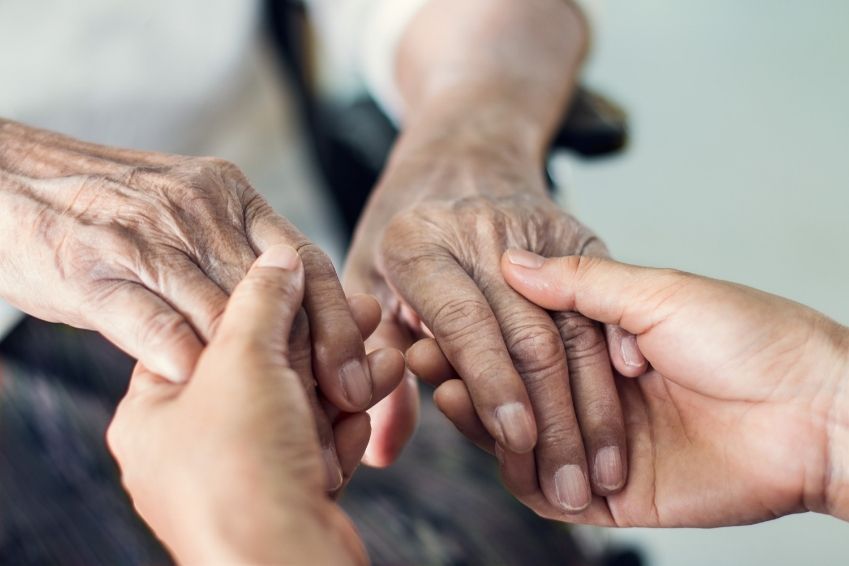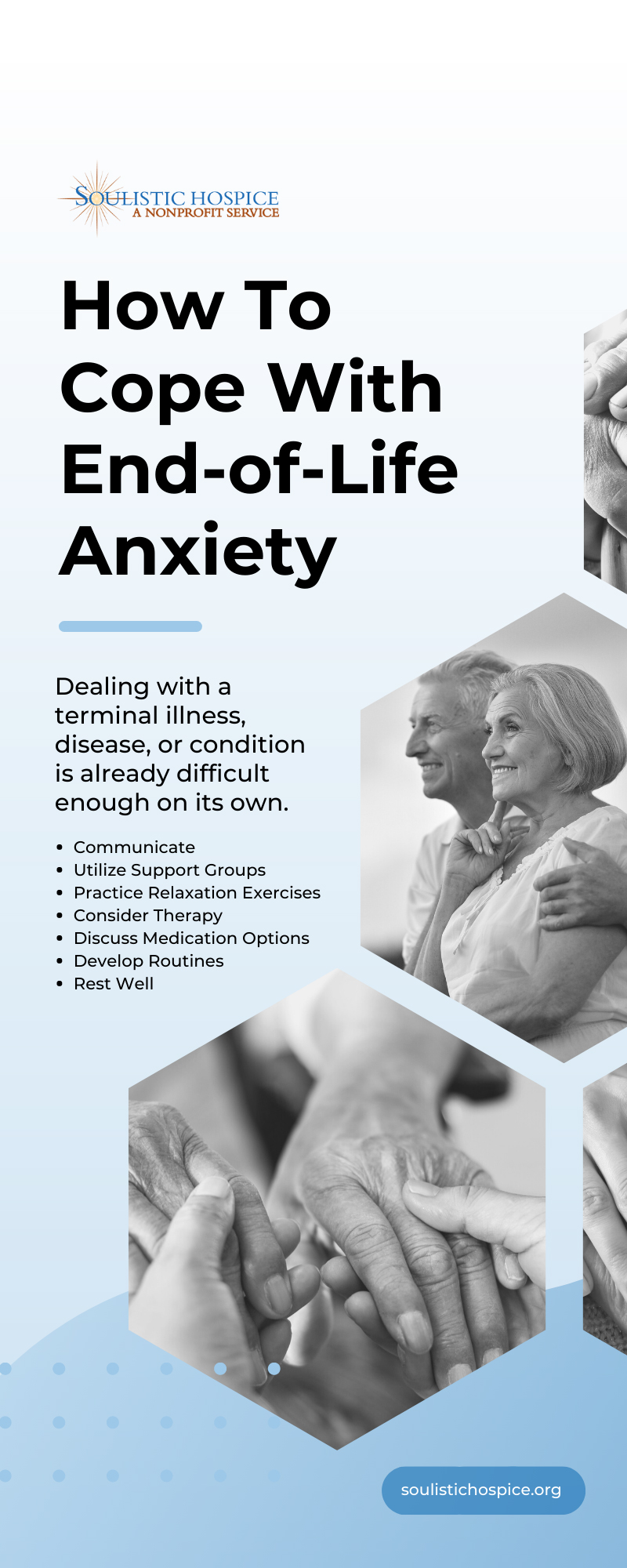
Dealing with a terminal illness, disease, or condition is already difficult enough on its own. Adding the layers of stress and anxiety of end-of-life experiences on top of that can be overwhelming. However, there are ways to manage these stressors, and fortunately, you don’t have to go through the process alone. Use this guide on how to cope with end-of-life anxiety.
Communicate
One of the first ways to cope with end-of-life anxiety is through communication. If you’re feeling immense stress and anxiety, it’s important to tell someone. Reaching out for help is the first and most important step in the process. No one will know you need help with your struggles if you don’t communicate.
There’s no shame in dealing with end-of-life anxiety; it’s an entirely natural human response to want to reach out. It can be exhausting to deal with that level of stress on your own while still trying to continue living your daily life. Talking to someone you trust about this anxiety is helpful to lift some of that burden off your shoulders. You can speak to a friend, a family member, or anyone you know who may be going through a similar experience.
Make sure that the person you choose to confide in is responsible and trustworthy and will give you compassionate advice and comfort you when you need it.
Utilize Support Groups
Support groups are another great way to cope with end-of-life anxiety. One of the amazingly effective communication methods with people who understand your situation is support groups. There are different kinds of support groups for people of all ages, genders, and walks of life. In addition, there are groups for those with specific diseases, conditions, and situations if that happens to be something to which you can relate.
Attending these groups gives you a support system comprised of others who are also seeking help. They also provide much-needed solidarity when dealing with end-of-life anxiety. You have the opportunity to build meaningful relationships with people who are going through similar situations and can empathize and relate to your experiences.
Practice Relaxation Exercises
Relaxation exercises can also help to ease end-of-life anxiety and stress. There are several different exercises tailored for those looking to relax and cope with life’s difficult emotions and physical experiences. Some of these exercises are as simple as a few breathing techniques to help calm the body and mind down in stressful situations. For example, taking a few moments out of your day to take a few long, deep breaths can help release stress and anxiety and recenter yourself and your breathing. Grounding techniques like breathing help you step away from cyclical thinking and be more present with your loved ones.
Consider Therapy
The next way to cope with end-of-life anxiety is to attend therapy. First, you will want to find the right therapist and therapeutic practice for you. Finding a therapist specializing in end-of-life or terminal illnesses may be helpful. Next, you want to take your time during consultations and ask questions of any prospective therapist. It’s important to choose someone you trust and feel safe enough around to open up with.
Therapy is a great way to find guidance and solutions to life’s problems from a trained professional giving unbiased and researched advice. Many people have attributed therapy to changing their lives and getting them back into a healthy mental space. For anyone undergoing end-of-life care, these sessions can also be an excellent opportunity to vocalize concerns that you aren’t comfortable sharing with your family.
Discuss Medication Options
Medication is another way to ease anxiety and stress-related to end-of-life. If you feel that you are struggling with your anxiety to the point that you cannot get through the day, it’s likely time to consider consulting with a medical professional. A doctor can inform you which medication options may help reduce your symptoms and provide you with a sense of agency over your daily life again.
Speak with a medical professional that you trust and look over your best options in terms of treatment and medication. There are many various anti-anxiety medicines available that are safe and work effectively to reduce symptoms like panic attacks.
Develop Routines
Developing a healthy routine is another way to help ease end-of-life anxiety. Routines add structure and purpose to your day and keep your body and mind busy. Building a simple pattern for your day-to-day life allows you to get things done and stay focused on positive tasks and activities.
It’s essential to begin your routine as soon as you wake up so you can set the tone for the rest of your day. For example, you can start your day with breakfast and a walk or meditate to clear your mind and release stress in the morning. Then, if you have any necessary tasks or errands to do, make sure to include them in your schedule in a way that works best for you.
Make sure to take time for meals if you’re hungry and schedule downtime when you need to relax. Finally, have a bedtime routine that allows you to wind down and get ready to sleep at night.
Rest Well
Finally, rest is a crucial tool to help you cope with end-of-life anxiety. Getting enough sleep is essential to your overall mental and physical health. Sleep allows your body and mind to rest, heal, recharge, and prepare for the next day.
A solid six to eight hours of sleep is standard for most adults, though there’s no need to hold yourself to this schedule. Allow yourself to rest for whatever amount of time is necessary to leave you feeling refreshed and ready.
This healthy amount of sleep will help you cope with and reduce anxiety. Quality sleep helps restore the brain, which is responsible for regulating emotions and physiological responses. Thus, when these parts of the brain restore during a good night’s rest, overall stress and anxiety decrease.
Now that you have some ideas on how to cope with end-of-life anxiety, you can begin implementing these techniques into your daily life. Soulistic Hospice offers an end-of-life care plan in Arizona that acknowledges feelings of anxiety, providing you and your loved ones with resources and compassionate staff to help throughout the process. Our team’s goal is to prepare you and your family for the most peaceful transition possible while still allowing you to get the most out of each day. Reach out to our team at Soulistic Hospice today and discover the care we can offer.









